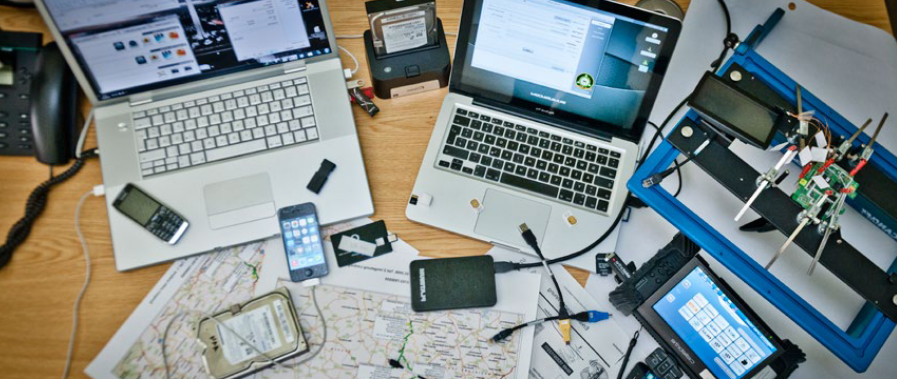In many cases, European authorities confiscate the phones of refugees after they have crossed the border in order to check their identity or to identify those helping them to flee. The people concerned do not always get their devices back. This means additional stress in the asylum procedure.
The Home Office in London admitted on Thursday that the blanket confiscation of migrants’ mobile phones is illegal. According to the British daily Independent, Home Secretary Priti Patel’s lawyer told this to the High Court. The judges are hearing a case brought by three asylum seekers from Iraq and Iran. They were arrested in 2020 after entering the country in small boats across the English Channel. In December, an appeals court ruled that this did not constitute illegal entry.
The authorities detained the devices for at least three months following an order and examined them forensically. According to the newspaper, in search of phone numbers, messages, pictures, videos, traffic data and GPS coordinates the entire memory of the devices was read out. The plaintiffs’ lawyers believe that the practice could affect hundreds or thousands of mobile phones a year. This is contrary to data protection and the European Convention on Human Rights, the British Home Office has now confirmed. The practice of pressuring asylum seekers to hand over their PIN numbers was also unlawful, it said.
German police do not keep statistics
In Germany, too, the mobile phones of refugees are confiscated and read out. According to the Residence Act, this is possible if the persons concerned do not have a valid passport or passport replacement at the time of a check. There are no nationwide or state-specific figures on this; MP Jule Nagel recently tried unsuccessfully to find out in the Saxon state parliament.
A seizure can also be made under section 94 of the Code of Criminal Procedure (StPO) for the purpose of preserving evidence on the grounds of “smuggling in foreigners”. However, the phones of people seeking protection are also taken away, “especially if sex offenders have been apprehended in connection with a smuggler”, writes the Federal Police headquarters in Potsdam after i had been asking them. The measure is thus carried out without any suspicion of a crime on the part of those affected. The Federal Police does not keep statistics on how many devices have been confiscated on the basis of the Code of Criminal Procedure.
“Voluntary” seizure, otherwise confiscation
Many asylum seekers cooperate with the authorities and also give them the PIN numbers of the phone. It is then taken by the police nevertheless, then considered a seizure. In case of refusal, the confiscation is ordered by a judge according to § 98 StPO. There are no statistics on this either, the public prosecutor’s office in Passau told me. In a press release, the authority had previously stated that “mobile phone evaluations” had increased considerably in its catchment area.
According to criminal procedure regulations, those affected should receive a seizure or confiscation protocol for the police action, writes the Federal Ministry of the Interior. When asked, the Passau Federal Police Inspectorate also replies that “a corresponding confirmation” is always issued. However, this is not always the case, according to refugee solidarity circles in North Rhine-Westphalia. The persons concerned are neither informed about the reason for the removal of their identity papers and mobile phones, nor do they always receive a receipt.
Order also in the asylum procedure
The Federal Police often ask the asylum seekers to certify in a “declaration of consent/waiver” that the seizure was not in accordance with § 98 of the Code of Criminal Procedure. It can be doubted that the persons concerned were sufficiently informed about this in a language they could understand and understood the difference.
According to the Federal Police Headquarters, the length of time the devices are retained “depends on the individual case and is done in close consultation with the public prosecutor’s office responsible in each case”.
In the subsequent asylum procedure, applicants are also urged to hand over their mobile phones at short notice, in accordance with the Asylum Act. The Federal Office for Migration and Refugees is responsible for this measure, which is intended to provide information on the origin or identity of the persons concerned. Last year, the Berlin Administrative Court ruled that this blanket reading of phones and data carriers was illegal. In 2020 alone, however, this was done in 6,247 cases, and in only 1.8 per cent of the cases were the analyses said to have revealed contradictions with the information provided by the applicants.
Handouts from EU agencies
For asylum seekers, the loss of a mobile phone often means additional stress in the asylum procedure, because the device is not only used to communicate with relatives and lawyers, but sometimes relevant documents for hearings are also stored on it. In Germany, as in the UK, many confiscations of mobile phones and storage media from refugees are therefore likely to be illegal.
If this would be well documented in a court of law, it would also have consequences for EU agencies. Frontex and Europol, for example, issue handouts on the seizure of communication devices of seekers for protection. They advise using “special tactics” to obtain passwords for forensic analysis. A new guide by Eurojust, the EU agency for judicial cooperation in criminal matters, goes in the same direction. According to the guide, there is “particularly valuable information” on the phones of refugees. If there is a suspicion of human smuggling, the refugees should also be monitored by the police with covert measures.
In Great Britain, the authorities were apparently not even able to analyse all the confiscated telephones. In October, the border police therefore allegedly began a “bulk returns process”. According to the Independent, the owners were asked to call a telephone number. Later, this number was replaced by an email address. If the asylum seekers did not call, the devices were destroyed.





Leave a Reply